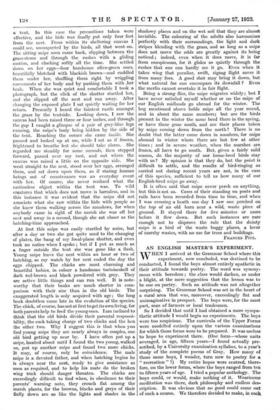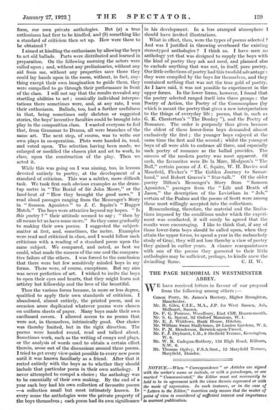AN ENGLISH MASTER'S EXPERIMENT.
WHEN I arrived at the Grammar School where this experiment, now concluded, was destined to be conducted, I found the boys almost entirely apathetic in their attitude towards poetry. The word was synony. mous with boredom ; the ,class would darken, as under a blight, at the mere suggestion that the lesson was to be one on poetry. Such an attitude was not altogether surprising. The Grammar School was set in the heart of a rural area that was, moreover, exceedingly flat and unimaginative in prospect. The boys were, for the most part, sons of farmers or local tradesmen.
So I decided that until I had obtained a more sympa- thetic attitude I would begin no experiments. The boys were too suspicious. The curricula of the Upper Forms were modelled entirely upon the various examinations for which those forms were to be prepared. It was useless to hope to experiment there. (One form—whose units averaged, in age, fifteen years—I found actually pre- scribed, by a University examination syllabus, to a year's study of the complete poems of Gray. How many of those same boys, I wonder, turn now to poetry for a " recreation " ?) My entire hopes were centred, there fore, on the lower forms, where the boys ranged from ten to fifteen years of age. I tried a popular anthology. The boys could, or would, make nothing of it. Wearisome meditation was there, dark philosophy and endless des. cription. It was obvious that no good could come out of such a course. We therefore decided to make, in each form, our own private anthologies. But (a) a true enthusiasm had first to be kindled, and (b) something like a standard of criticism then set up. How were these to be obtained ?
I aimed at kindling the enthusiasm by allowing the boys to act old ballads. Parts were distributed and learned in preparation. On the following morning the actors were called upon ; and, without any preliminaries, without any aid from me, without any properties save those they could lay hands upon in the room, without, in fact, any- thing except their own imagination to guide them, they were compelled to go through their performance in front of the class. I will not say that the results revealed any startling abilities to act ; comically individual interpre- tations there sometimes were, and, at any rate, I won their enthusiasm. Ballads, too, had a further usefulness in that, being sometimes only skeleton or suggested stories, the boys' inventive faculties could be brought into play in the composition class. I wanted everyone to feel that, from Grammar to Drama, all were branches of the same art. The next step, of course, was to write our own plays in co-operation. Plots were handed in, read, and voted upon. The selection having been made, we enlarged or modified the chosen plot and set to work, in class, upon the construction of the play. Then we acted it.
While this was going on I was aiming, too, in lessons devoted entirely to poetry, at the development of a standard of criticism. This was a subtler, more difficult task. We took first such obvious examples as the drum- tap metre in " The Burial of Sir John Moore," or the hoof-beat of " How they brought the good news." I read aloud passages ranging from the Messenger's Story in " Samson Agonistes " to J. C. Squire's " Rugger Match." The boys were attentive beyond my hopes. " Is this poetry ? " their attitude seemed to say ; " then by all means let us have some more." So they came gradually to making their own poems. I suggested the subject- matter at first, and, sometimes, the metre. Examples were read and criticized in class, and I would follow such criticisms with a reading of a standard poem upon the same subject. We compared, and noted, as best we could, what made the success of the one and the compara- tive failure of the others. I was forced to the conclusion that there were but few sensitively minded boys in my forms. There were, of course, exceptions. But my aim was never perfection of art. I wished to incite the boys to open their eyes and hearts, that they might learn not artistry but fellowship and the love of the beautiful.
Thus the various forms became, in more or less degree, qualified to apply their own standards of criticism. I abandoned, almost entirely, the printed poem, and as occasion arose duplicated whatever poems were chosen on uniform sheets of paper. Many boys made their own cardboard covers. I allowed access to no poems that were not, in themselves, intrinsically good. Our choice was thereby limited, but in the right direction. The poems were handed round, read and talked about. Sometimes work, such as the writing of essays and plays, or the analysis of words used to obtain a certain effect therein, arose out of the discussions around these poems. I tried to get every view-point possible to every new poem until it was known familiarly as a friend. After that it rested entirely with the boys as to whether they should include that particular poem in their own anthology. I never attempted to compel a choice ; the anthology was to be essentially of their own making. By the end of a year each boy had his own collection of favourite poems —a collection small but most intimately known. In every sense the anthologies were the private property of the boys themselves ; each poem had its own significance in his development. In a less cramped atmosphere I should have invited illustrations.
What in effect, then, were the types of poems selected ? And was I justified in throwing overboard the existing stereotyped anthologies ? I think so. I have seen no anthology yet that was designed to supply the boys with the kind of poetry they ask and need, and planned also to exclude anything that was not, in itself, pure poetry. Our little collections of poetry had this twofold advantage : they were compiled by the boys for themselves, and they contained nothing that was not the true gold of poetry. As I have said, it was not possible to experiment in the upper forms. In the lower forms, however, I found that the poetry selected ranged itself into three groups : the Poetry of Action, the Poetry of the Commonplace (by which is meant the poetry that gives a new interpretation to the things of everyday life ; poems, that is, such as G. K. Chesterton's " The Donkey "), and the Poetry of Romance. The order is purposely thus given because the oldest of these lower-form boys demanded almost exclusively the first ; the younger boys enjoyed at the same time the first and the second ; whilst the youngest boys of all were able to embrace all three, and especially such poetry of romance as the ballad provides. The success of the modern poetry was most apparent. Of such, the favourites were De la Mare, Hodgson's " The Bull," certain poems of J. C. Squire, W. H. Davies and Masefield, Flecker's " The Golden Journey to Samar- kand," and Robert Graves's " Star-talk." Of the older poetry Milton's Messenger's Story from " Samson Agonistes," passages from the " Life and Death of Jason," the description of the Leviathan in " Job," certain of the Psalms and the poems of Scott were among those most willingly accepted into the collections.
Remembering, therefore, the material and the limita- tions imposed by the conditions under which the experi- ment was conducted, it will surely be agreed that the results were encouraging. I like to think that, if any of those lower-form boys should be called upon, when they attain the upper forms, to spend a year in the melancholy study of Gray, they will not lose thereby a view of poetry they gained in earlier years. A chance reacquaintance with one of the poems they garnered to their little anthologies,may be sufficient, perhaps, to kindle anew the











































 Previous page
Previous page